Starting from:
$12.95
Home
Intell Espionage
Jonathan Pollard Spy Case - Damage Assessments, CIA, FBI, Department of Defense, White House Files
Jonathan Pollard Spy Case - Damage Assessments, CIA, FBI, Department of Defense, White House Files
Jonathan Pollard Spy Case - Damage Assessments, CIA, FBI, Department of Defense, White House Files
2,614 pages of CIA, FBI, Department of Defense Files and Congressional Research Service reports and White House documents covering the Jonathan Pollard spy case.
Jonathan Jay Pollard (born August 7, 1954) was an intelligence analyst for the Naval Investigative Service. In 1987, as part of a plea agreement, Pollard pleaded guilty to spying for and providing top-secret classified information to Israel. He was sentenced to life in prison for violations of the Espionage Act. He was granted parole on July 7, 2015 and released on November 20, 2015.
The core 1,250 pages of documents in this collection include:
The Jonathan Jay Pollard Espionage Case: A Damage Assessment, October 30, 1987.
In 1987, the CIA's Foreign Denial and Deception Analysis Committee, at the direction of the Director of Central Intelligence, produced a Top Secret/Codeword 166-page study examining the damage caused by Jonathan Pollard's espionage on behalf of Israel in 1984 and 1985. The focus of the study was Pollard's personal history and espionage career, Israeli intelligence priorities and requests, material provided by Pollard, as well as losses and vulnerabilities. Additional material includes a detailed chronology and lessons learned in this case concerning security and counterintelligence.
The report includes a section titled "What the Israelis Did Not Ask For." The study states that Israel "never expressed interest in US military activities, plans, capabilities, or equipment." The report says that Pollard's Israeli handlers sought information about Syrian drones and central communications, Egyptian missile programs, and Soviet air defenses. Israel was greatly interested in a signals intelligence manual that would allow them to listen in on Soviet advisers in Syria.
When interviewed by the FBI, Pollard claimed that a key contributing factor to his actions was his concern and frustration over the inadequate US reaction following the bombing of the U.S. Marine headquarters in Beirut in October 1983. Pollard rationalized that if the U.S. Government was unwilling to take effective countermeasures to protect its own interests in Lebanon, then it might be unwilling or unable to provide Israel with adequate assistance in the event of critical need. Pollard stated he "walked out of the memorial service (for the Marines) committed to doing something that would guarantee Israel's security even though it might involve a degree of potential risk and personal sacrifice."
U.S. Naval Investigative Service (NIS) Pollard Case Summaries July 1986 to November 1991
Congressional Research Service - Jonathan Pollard Background and Considerations for Presidential Clemency
Memorandums submitted to the Court by Pollard about the documents compromised by him.
FBI memo on information and material Pollard was exposed to on a June 1984 visit to the CIA by Pollard.
January 7, 1987 - Secretary of Defense Caspar W. Weinberger Sentencing Affidavits for Jonathan Pollard
Additional Material includes:
Espionage Against the United States by American Citizens 1947-2001 (2002)
A 135-page report produced by TRW Systems and released by the Defense Personnel Security Research Center.
Analyses of 150 cases of espionage against the United States by American citizens between 1947 and 2001, including Pollard. Provides detailed data on the demographic and employment characteristics of American spies, on the means and methods they used to commit espionage, on their motivations, and on the consequences they suffered. Collected materials on the cases supplement the analyses conducted with a database that allows comparison of groups and the identification of trends. Factors highlighted include changes in espionage by Americans since the end of the Cold War and the impact of globalization and networked information systems on the practice of espionage.
Clinton Administration Files
1,246 pages from the office of former Associate Counsel to President Bill Clinton, Meredith Cabe. Files contain Congressional correspondence, correspondence with the public, copies of petitions and legal documents filled by lawyers representing Johnathan Pollard and White House pardon documents concerning Pollard
About Jonathan Jay Pollard
Jonathan Jay Pollard, born August 7, 1954, in Galveston, Texas, is a convicted Israeli American spy. While working as an American civilian intelligence analyst for the Navy, he passed classified information to Israel. He was convicted and received a life sentence in 1987. As his crime occurred prior to November 1, 1987, he was eligible for parole.
Pollard attended Stanford University and the Fletcher School of Law and Diplomacy at Tufts University. According to Ronald J. Olive, author of the book, "Capturing Jonathan Pollard: How One of the Most Notorious Spies in American History Was Brought to Justice," he amused his classmates with his espionage fantasies, he claimed to be a Mossad colonel, but he wasn’t taken seriously. When Pollard’s application to the CIA was rejected, he went to the Naval Investigative Service (NIS) and found a home in its Anti-Terrorist Alert Center (ATAC).
Pollard was turned in by a colleague at work who noticed that Pollard requested classified documents not needed in his work. The FBI entered the case on November 15 and began a series of interviews with Pollard. After an interview with FBI agents on November 21, Pollard and his wife drove to the Israeli Embassy in Washington where they stayed for approximately 20 minutes. Inside the Embassy, Pollard requested political asylum with the hope of fleeing the United States. The Israelis refused to grant them asylum. Jonathan Pollard was arrested on November 21, 1985, outside the Israeli Embassy. The next day, the FBI arrested his wife, Anne Henderson Pollard. They were charged with selling classified documents to Israel. Four Israeli officials also were indicted but escaped the United States. The Israeli government claimed that it was a rogue operation.
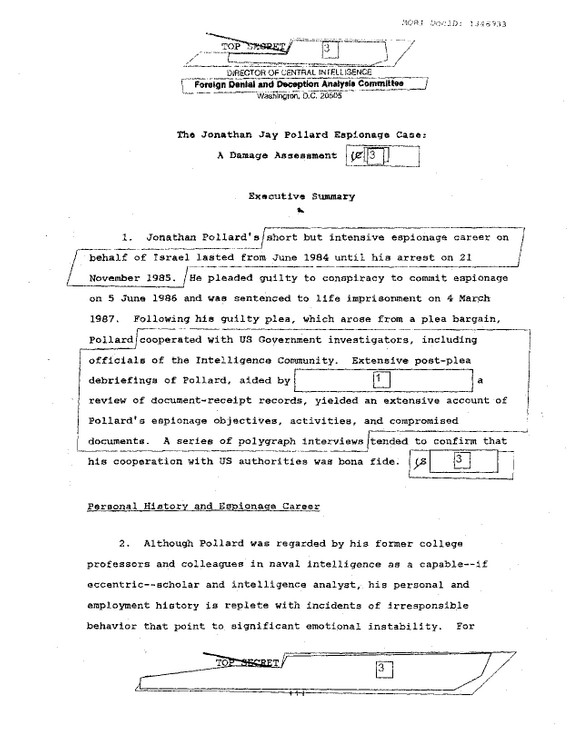
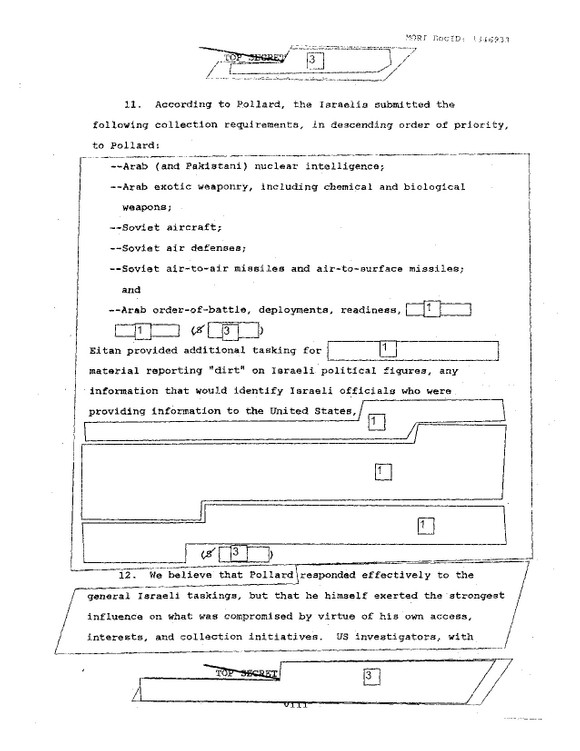
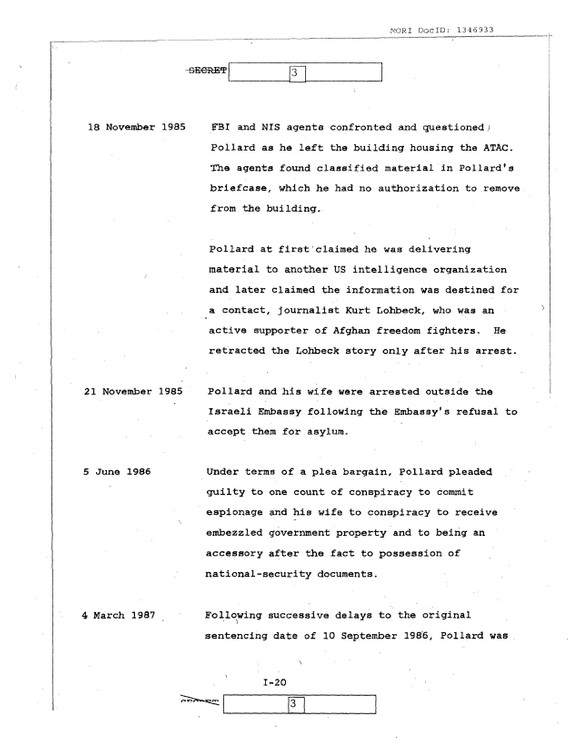
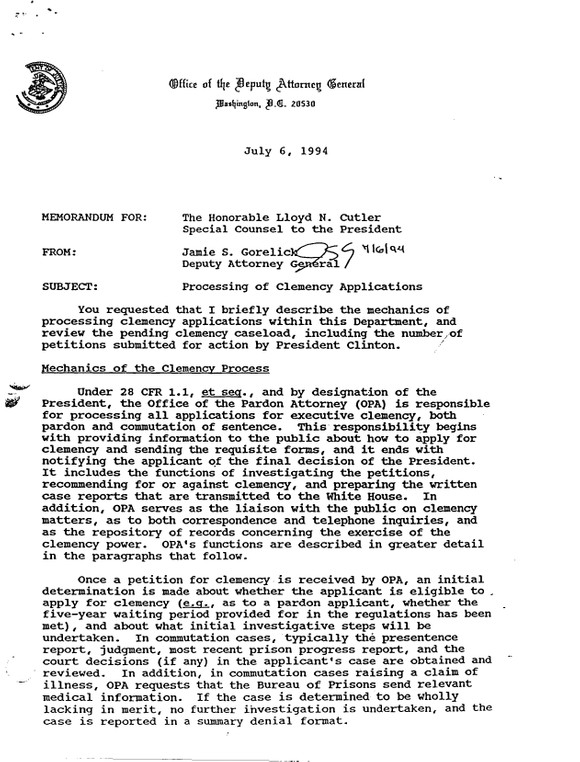
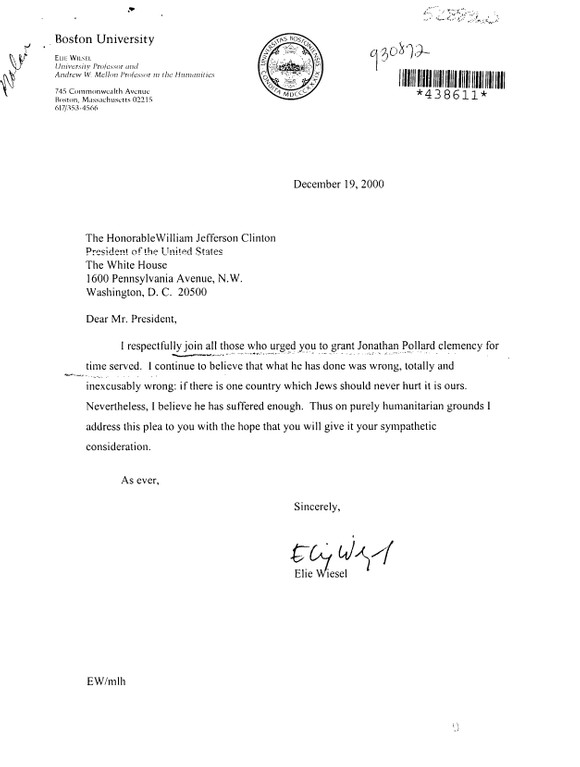
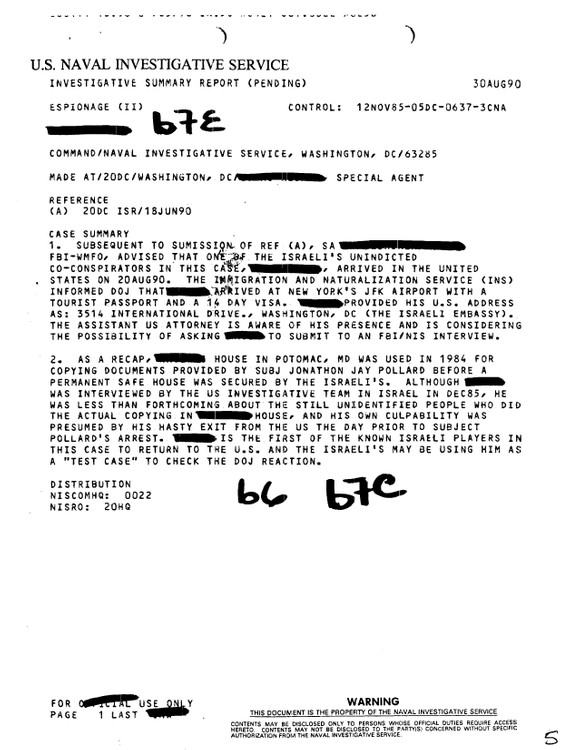

2,614 pages of CIA, FBI, Department of Defense Files and Congressional Research Service reports and White House documents covering the Jonathan Pollard spy case.
Jonathan Jay Pollard (born August 7, 1954) was an intelligence analyst for the Naval Investigative Service. In 1987, as part of a plea agreement, Pollard pleaded guilty to spying for and providing top-secret classified information to Israel. He was sentenced to life in prison for violations of the Espionage Act. He was granted parole on July 7, 2015 and released on November 20, 2015.
The core 1,250 pages of documents in this collection include:
The Jonathan Jay Pollard Espionage Case: A Damage Assessment, October 30, 1987.
In 1987, the CIA's Foreign Denial and Deception Analysis Committee, at the direction of the Director of Central Intelligence, produced a Top Secret/Codeword 166-page study examining the damage caused by Jonathan Pollard's espionage on behalf of Israel in 1984 and 1985. The focus of the study was Pollard's personal history and espionage career, Israeli intelligence priorities and requests, material provided by Pollard, as well as losses and vulnerabilities. Additional material includes a detailed chronology and lessons learned in this case concerning security and counterintelligence.
The report includes a section titled "What the Israelis Did Not Ask For." The study states that Israel "never expressed interest in US military activities, plans, capabilities, or equipment." The report says that Pollard's Israeli handlers sought information about Syrian drones and central communications, Egyptian missile programs, and Soviet air defenses. Israel was greatly interested in a signals intelligence manual that would allow them to listen in on Soviet advisers in Syria.
When interviewed by the FBI, Pollard claimed that a key contributing factor to his actions was his concern and frustration over the inadequate US reaction following the bombing of the U.S. Marine headquarters in Beirut in October 1983. Pollard rationalized that if the U.S. Government was unwilling to take effective countermeasures to protect its own interests in Lebanon, then it might be unwilling or unable to provide Israel with adequate assistance in the event of critical need. Pollard stated he "walked out of the memorial service (for the Marines) committed to doing something that would guarantee Israel's security even though it might involve a degree of potential risk and personal sacrifice."
U.S. Naval Investigative Service (NIS) Pollard Case Summaries July 1986 to November 1991
Congressional Research Service - Jonathan Pollard Background and Considerations for Presidential Clemency
Memorandums submitted to the Court by Pollard about the documents compromised by him.
FBI memo on information and material Pollard was exposed to on a June 1984 visit to the CIA by Pollard.
January 7, 1987 - Secretary of Defense Caspar W. Weinberger Sentencing Affidavits for Jonathan Pollard
Additional Material includes:
Espionage Against the United States by American Citizens 1947-2001 (2002)
A 135-page report produced by TRW Systems and released by the Defense Personnel Security Research Center.
Analyses of 150 cases of espionage against the United States by American citizens between 1947 and 2001, including Pollard. Provides detailed data on the demographic and employment characteristics of American spies, on the means and methods they used to commit espionage, on their motivations, and on the consequences they suffered. Collected materials on the cases supplement the analyses conducted with a database that allows comparison of groups and the identification of trends. Factors highlighted include changes in espionage by Americans since the end of the Cold War and the impact of globalization and networked information systems on the practice of espionage.
Clinton Administration Files
1,246 pages from the office of former Associate Counsel to President Bill Clinton, Meredith Cabe. Files contain Congressional correspondence, correspondence with the public, copies of petitions and legal documents filled by lawyers representing Johnathan Pollard and White House pardon documents concerning Pollard
About Jonathan Jay Pollard
Jonathan Jay Pollard, born August 7, 1954, in Galveston, Texas, is a convicted Israeli American spy. While working as an American civilian intelligence analyst for the Navy, he passed classified information to Israel. He was convicted and received a life sentence in 1987. As his crime occurred prior to November 1, 1987, he was eligible for parole.
Pollard attended Stanford University and the Fletcher School of Law and Diplomacy at Tufts University. According to Ronald J. Olive, author of the book, "Capturing Jonathan Pollard: How One of the Most Notorious Spies in American History Was Brought to Justice," he amused his classmates with his espionage fantasies, he claimed to be a Mossad colonel, but he wasn’t taken seriously. When Pollard’s application to the CIA was rejected, he went to the Naval Investigative Service (NIS) and found a home in its Anti-Terrorist Alert Center (ATAC).
Pollard was turned in by a colleague at work who noticed that Pollard requested classified documents not needed in his work. The FBI entered the case on November 15 and began a series of interviews with Pollard. After an interview with FBI agents on November 21, Pollard and his wife drove to the Israeli Embassy in Washington where they stayed for approximately 20 minutes. Inside the Embassy, Pollard requested political asylum with the hope of fleeing the United States. The Israelis refused to grant them asylum. Jonathan Pollard was arrested on November 21, 1985, outside the Israeli Embassy. The next day, the FBI arrested his wife, Anne Henderson Pollard. They were charged with selling classified documents to Israel. Four Israeli officials also were indicted but escaped the United States. The Israeli government claimed that it was a rogue operation.







1 file (204.7MB)



